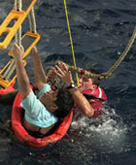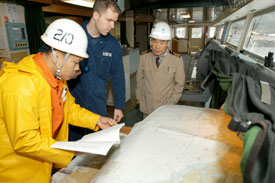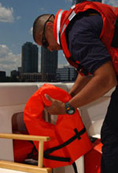
Missions
Maritime Safety
- Search and Rescue
- Maritime Safety
- Recreational Boating Safety
- Passenger Vessel Safety
- International Ice Patrol
- Port Security
 The goal of safety is pursued primarily through our search and rescue and
marine safety missions. Search
and Rescue (SAR) is perhaps the Coast Guard's best-known mission area,
and the service is recognized as the world's leader by the international
SAR community. When the rescue alarm sounds, the Coast Guard is ready to
confront the inherently dangerous maritime environment, frequently going
into harm's way to save others. The Coast Guard works closely with other
federal, state, and local agencies, and with foreign nations, to provide
the world's fastest and most effective response to distress calls. It also
maintains a vessel-tracking system called Amver
(automated mutual assistance vessel rescue) that allows it to divert nearby
commercial vessels to render assistance when necessary.
The goal of safety is pursued primarily through our search and rescue and
marine safety missions. Search
and Rescue (SAR) is perhaps the Coast Guard's best-known mission area,
and the service is recognized as the world's leader by the international
SAR community. When the rescue alarm sounds, the Coast Guard is ready to
confront the inherently dangerous maritime environment, frequently going
into harm's way to save others. The Coast Guard works closely with other
federal, state, and local agencies, and with foreign nations, to provide
the world's fastest and most effective response to distress calls. It also
maintains a vessel-tracking system called Amver
(automated mutual assistance vessel rescue) that allows it to divert nearby
commercial vessels to render assistance when necessary.
The Coast Guard's Marine Safety Program promotes safety through both its regulatory and inspection roles, inspecting merchant vessels and licensing their masters and crews. The Coast Guard's goal is to reduce crewmember deaths and injuries on U.S. commercial vessels; passenger deaths and injuries; and the number of collisions and groundings in the waters under Coast Guard jurisdiction.In a dedicated effort to prevent future mishaps, the Coast Guard investigates maritime accidents. Lessons learned from accident investigations are fed back into prevention programs, frequently in the form of revised regulations and safety standards. As an international leader, the Coast Guard works with other nations and agencies--like the International Maritime Organization, for example--to promote higher safety standards for commercial vessels and their crews.
 As the lead U.S. representative to the International
Maritime Organization, a specialized agency of the United Nations, we
are the driving force behind the implementation of international safety
and pollution standards. However, not every country enforces these standards.
With the increase in so-called flags of convenience, has come an increase
in the number of substandard vessels. The Coast Guard has developed a comprehensive
U.S. strategy to promote and improve the Port State Control program, an
international effort to bring substandard ships into compliance with applicable
international standards or remove them from the sea.
As the lead U.S. representative to the International
Maritime Organization, a specialized agency of the United Nations, we
are the driving force behind the implementation of international safety
and pollution standards. However, not every country enforces these standards.
With the increase in so-called flags of convenience, has come an increase
in the number of substandard vessels. The Coast Guard has developed a comprehensive
U.S. strategy to promote and improve the Port State Control program, an
international effort to bring substandard ships into compliance with applicable
international standards or remove them from the sea.
In addition to commercial vessels, more than 76 million recreational boaters use our waterways. Our recreational boating safety program is focused on minimizing the loss of life and property and damage to the environment. The Coast Guard Auxiliary, the 35,000-person civilian volunteer arm of the Coast Guard, is a key contributor to these boating safety efforts and has augmented our missions for over 60 years. The Coast Guard Auxiliary provides free boating safety courses, courtesy marine examinations for recreational boaters, verification for aids to navigation, and inspections of commercial facilities.

